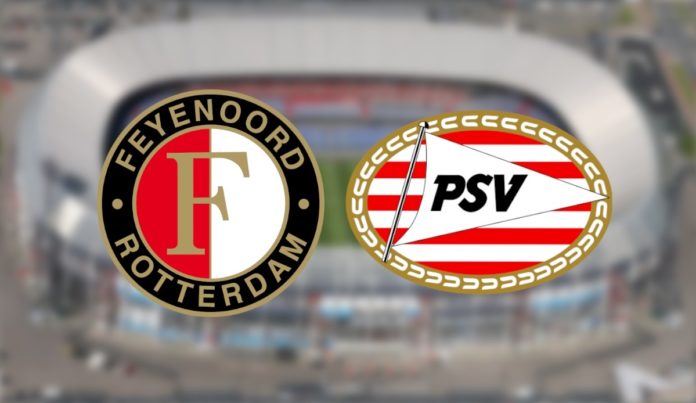PSV had another challenging night on artificial grass, but yet again managed to take the three points home. Because AZ, Feyenoord and Vitesse lost their matches, the Eindhoven side took stronger hold of the second position. Next stop is Rotterdam south, for the third top match of the month.
PSV travelled to Emmen without several key players and the suspended head coach Roger Schmidt. This sanction resulted from his conflicts with referee Bas Nijhuis, whose neutrality and potency he openly questioned after the match against Sparta Rotterdam. Assistant coach Lars Kornetka took over duties for this special occasion.
Cody Gakpo, Mario Götze, Mohamed Ihattaren, Noni Madueke and Nick Viergever stayed in Eindhoven because they were all injured. Marco Van Ginkel was left behind because they didn’t want to risk him on artificial grass. Two defenders and a striker from the Under 21 squad completed the squad in Emmen.
Kornetka started with the following eleven: Mvogo; Dumfries, Teze, Boscagli, Max; Sangaré, Rosario; Thomas, Fein; Zahavi and Malen. Antonisse, Baumgartl, Delanghe, Guti, Kreekels, Mauro, Piroe, Sambo and Unnerstall.
Emmen coach Dick Lukkien let his eleven start in a 4-2-3-1 line-up: Telgenkamp; van Rhijn, Araujo, Bakker, Cavlan; Vlak, Ben Moussa; Laursen, Pena, Frei; De Leeuw.
First Half
PSV showed their offensive intentions directly from the start, which resulted in some half-chances after five minutes but didn’t do Emmen any harm until then. In the 10th minute Eran Zahavi almost scored the opening goal, and Donyell Malen soon after, but both times goalkeeper Dennis Telgenkamp kept his sheet clean.
After 15 minutes, PSV got a chance out of a corner kick, but Rosario’s header went wide. They kept pressing on, while Emmen kept playing the long ball. This led to one small opportunity for Michael De Leeuw, but he couldn’t turn it into a chance and lost the ball to Yvon Mvogo.
The majority of the match took place on Emmen’s half, who kept the pitch small as soon as PSV had ball possession. The Eindhoven side got several corner kicks, but never managed to create serious danger from them. Olivier Boscagli decided to shoot from 20 meters but didn’t aim well.
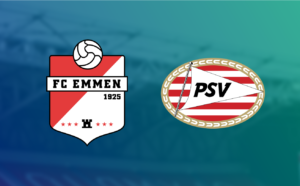
Zahavi headed a free-kick to the far corner, but De Leeuw blocked it. The home side slowly started to crawl out of their shell, and PSV moved back slightly. Denzel Dumfries got injured but managed to fire one shot before he left the pitch. Yet again, PSV didn’t manage to create any serious danger from the following corner kick.
The best moment for the home side was for Jari Vlak, who fired on target but saw his shot burst on the goalpost. With 46 minutes on the clock and 0-0 on the scoreboard, both teams went into the dressing room.
Second half
Both teams began the second half with the same eleven. They put a lot of labour into the match, but the quality level of football played was below average. It appeared that both sides lacked automatisms, patterns, maybe ideas but also the strategy as to how to play and build up attacks.
A scrimmage in the 62nd minute was the closest PSV came to scoring a goal. They kept ploughing and searching for a way to reach the strikers, but both of them had trouble understanding each other. Nikolai Laursen just failed to hit home from a counter-attack, and then there were only 20 minutes left…
Philipp Max was substituted for Timo Baumgartl, and Boscagli took over the left-back position. With 12 official minutes left, Érick Gutiérrez came in for Ryan Thomas and Mauro Júnior for Adrian Fein which were the last tactical changes implemented.
And it worked: a deep assist from Mauro missed Zahavi went in the goal via the inside of the second post: 0-1. FC Emmen created some danger from a counter-attack, but PSV countered back and saw Mauro make the difference again. This time his assist did reach Zahavi perfectly, and he headed the 0-2 against the nets.
This lead offered room for the debut of Jeremy Antonisse, who came in for Zahavi, and Joel Piroe replaced Donyell Malen. The joy and relief of an easy ending were replaced with fear when Dumfries went down writhing in pain after twisting his knee. Fortunately, the captain was able to secure that he was okay in an interview with ESPN directly after the final whistle.
Watch the full resume right here.
Next opponent: Feyenoord Rotterdam (away)
Feyenoord is not the first or only, but certainly the biggest club from Rotterdam. Sparta is the oldest club and hail from the western part of the city, while SBV Excelsior is located in the centre. Feyenoord is named after the region in the South of the second biggest city in the Netherlands, which has the biggest harbour of Europe.
The home matches are played at Stadion Feijenoord, nicknamed ‘De Kuip’ – meaning ‘the tub’ – due to its shape and blue coloured seats. It has a capacity of 51.117 visitors and has the name of always being sold out due to its loyal and very fanatic supporters, who come from the city, the region and all over the country.
Feyenoord plays in red and white shirts with black shorts and socks and is one of the three classical Dutch top teams, next to Ajax and PSV. The total budget is €68 million, and Dick Advocaat is the current head coach.
History
After Sparta was established in 1888, and Excelsior in 1902, Feyenoord was initiated in 1908, under the name ‘Wilhelmina’. They played in red shirts with blue sleeves and white shorts, then fused with ‘Volharding’ in 1909 and changed the name to HFC, which stood for Hillesluisse Football Combinatie.
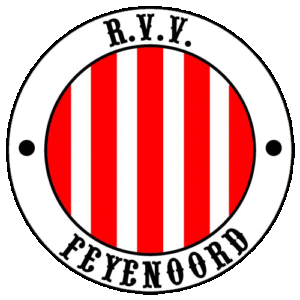
Because there was already a team with that name in Haarlem, they changed it to RVV Celeritas and also switched to jerseys with horizontally yellow-and-black striped shirts and white shorts. After another name change – to RVV Feijenoord – the colours became what they are now: white on the left and red on the right, with the sleeves in counter colour.
First successes
The first success came 16 years after the establishment and three years after the promotion to the highest level in 1921: the national championship in 1924. It was the first of many to come, with the second in 1928 and the last of all 15 in 2017. The first KNVB Cup victory was celebrated in 1930, and the last in 2018.
The first time Feyenoord won the double was in 1965, and the first Europa Cup 1 (current Champions League) trophy was conquered in 1970. Several months later they also won the World Cup for club teams, and in 1974 they took the UEFA Cup home to Rotterdam.
Feyenoord is also the last Dutch club to win a European title. In 2002 they beat Borussia Dortmund 3-2 at the De Kuip, where the final took place. In the years after that, especially after 2006, things went downhill, with the 134th place on the UEFA rank in 2014 as an all-time low.
Financial trouble
In the season of 2010/11 the club’s finances were so bad that they were placed in Category 1, which meant they were under serious supervision of the Dutch Royal Football Union. The bad results in the national competition resulted in years without Champions League football, while many players had big salaries.
On 24 October of 2010, PSV beat the Rotterdammers with 10-0 and pushed the club further to the cliff’s edge. Four days later a group of investors under the name of ‘Vrienden van Feyenoord’ took over 49% of the shares for €17 million, bringing the total club debt down to €26 million.
Rebirth
In the summer of 2011 Feyenoord sold a couple of youth exponents in order to furder down its debts, Georghinio Wijnaldum being one of them. Ronald Koeman was appointed as head coach, with Jean-Paul van Gastel and Giovanni van Bronckhorst as assistants. They became second in their first season and reached the playoffs for the Champions League tournament.
Van Bronckhorst took over as head coach in 2015 and won the KNVB Cup directly after his first season. Dirk Kuijt had returned to his favourite club, and that had a lot of impact among the players’ group, with the first national title in 18 years in 2017 as a result. He scored three goals on the last day of the season and ended his career with the 15th championship for Feyenoord.
Biggest players
Some of the talented players to have ever played for Feyenoord, are stopscorer Cor van der Gijp, club icon Coen Moulijn, Swedish striker Ove Kindvall, Willem van Hanegem, Johan Cruijff, Ruud Gullit, Ronald Koeman, Jerzy Dudek, Pierre van Hooijdonk, Henrik Larsson, Jon Dahl Tomasson, Dirk Kuyt, Karim El Ahmadi and Ruud Vormer.
Feyenoord has lately invested more in their own Academy. In previous years, they lost many players to other clubs, and as a result of that, only a few players represented Feyenoord in the Eredivisie and moved abroad without bringing in any transfer money.
Examples of players who played in the Feyenoord Academy in the past are: Jean-Paul Boëtius, Giovanni van Bronckhorst, Jeffrey Bruma, Royston Drenthe, Anwar El Ghazi, Leroy Fer, Jonathan de Guzman, Daryl Janmaat, Rik Karsdorp, Robin van Persie, Karim Rekik, Marten de Roon, Pablo Rosario, Euzebiusz ‘Ebi’ Smolarek, Tonny Vilhena, Stefan de Vrij and Gini Wijnaldum.
Rivalry
Rival supporters call Feyenoorders ‘kakkerlakken’, which is Dutch for ‘cockroaches’. Feyenoord is the absolute arch-rivals of Ajax. Not only does it go between the two biggest cities in the country, but the main issue is also the difference in mentality. Where the Rotterdammers are known for their hard work and down-to-earth mentality, Amsterdammers are known for their big mouths.
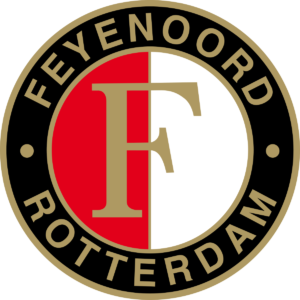
This rivalry is noticeable in the matches in De Kuip and anywhere in the country when supporters meet. The worst moment in history was when Ajax F-Side supporters waited up SCF Feyenoord hooligans in Beverwijk, on 23 March of 1997. During this ‘battle’ at the pasture along the A9 highway, fights got so heavy that one of the Ajax supporters lost his life. Supporters from both sides have been excluded from visiting away matches for many years already.
The local rivalry in Rotterdam goes between Sparta and Feyenoord; the elite against the working class heroes. There have also been several feuds between Feyenoord and PSV hooligans, but the animosity isn’t comparable to what both sides have against Amsterdammers. Usually, the club’s name isn’t even spelt or spoken out but replaced for the dialling code of the city – 010 for Rotterdam and 020 for Amsterdam.
Facts and Figures
PSV and Feyenoord played a total of 166 matches against each other throughout history. PSV won 58 and lost 66 times, scored 261 and conceded 249 goals. In the context of the Eredivisie competition, PSV won 34,9% and lost 41,1% of their matches.
Since the first meeting in the season of 1928/1929, PSV played 73 competition matches at De Kuip. They only won 13 and lost 38 times, which shows that the Eindhoven side has trouble dealing with the aggression and fanaticism of the Feyenoord supporters. They went home with three points only five times in the last 20 years.
The last victory in Rotterdam Zuid dates back to 25 February of 2018, when PSV won 1-3. The last away match took place on 15 December of 2019, when Feyenoord won 3-1. Their biggest victory over PSV was recorded in the season of 1931/1932 when they sent the Noord-Brabanders home with a 6-0 loss.
Familiar faces
Marcel Brands, Timothy Derijck, Henk Fraser, Ruud Gullit, Joop Hiele, Danko Lazović, Anthony Lurling, Kees Rijvers and Edwin Zoetebier played for Feyenoord before they moved to PSV, either as a player or trainer.
Otman Bakkal, Kevin Hofland, Ronald Koeman, Joonas Kolkka, Patrick Lodewijks, Ton Lokhoff, Theo Lucius, Rob Maas, Luciano Narsingh, Patrick Paauwe all played for PSV before they moved to Rotterdam and put on a Feyenoord jersey. Technical manager Frank Arnesen played for PSV between 1985 and 1988, where he was also assistant trainer, technical manager and commissioner.
Of PSV’s current selection, Joel Piroe and Pablo Rosario are the only two players with a history in Rotterdam. Both played for the Feyenoord Academy for one season. Current Feyenoord coach Dick Advocaat was the head coach in Eindhoven twice before: between 1994 and 1998 and in the season of 2012/13.
Current situation
Feyenoord is the current number five of the Eredivisie. They won 10 of all 19 matches and lost three matches this month already: 1-0 against Ajax in Amsterdam, 2-3 against AZ in Alkmaar and 3-0, last Wednesday against SC Heerenveen in Friesland.
Head coach Dick Advocaat announced that this would be his last season as a head coach anytime, anywhere. TM Arnesen already attracted former AZ coach Arne Slot as new head coach, but he will start only after Advocaat has finished his job.
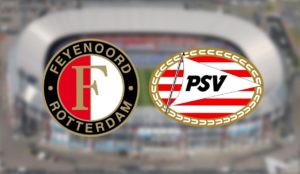
Strengths and weaknesses
Feyenoord’s strength is absolutely the will to fight and the experienced players they have. The weakness is the lack of real quality of individual players, who can make the difference and decide a match independently. On top of that, they don’t have a goal-scoring striker.
Advocaat had chosen for a compact playing style and managed to stay undefeated for 26 matches in a row in 2019. Now that 2021 has turned out differently for the Rotterdammers, both the technical staff and players have decided to have a serious talk to change the course of things.
Situation PSV
Roger Schmidt can take place on the bench again, but it is unsure whether the players he missed in the last weeks are fit to join the squad again. Mohamed Ihattaren is back, Denzel Dumfries and Cody Gakpo can both rejoin the group training, but maybe not start at the kick-off on Sunday.
Mario Götze, Noni Madueke, Armando Obispo, Yorbe Vertessen and Nick Viergever all will not be able to join the squad yet. For the latest updates, watch the pre-match press conference at or after 13:30 (1 PM) right here.
Match information
Match: Feyenoord Rotterdam – PSV
Date: Sunday 31 January 2021
Time: 14:30 (2:30 PM)
Location: Stadion Feijenoord (‘De Kuip’), Rotterdam Zuid
Referee: Dennis Higler
VAR: Rob Dieperink
Broadcast: ESPN
Article by Joey van der Hart for Eindhoven News
Join the conversation online at this Facebook page.


